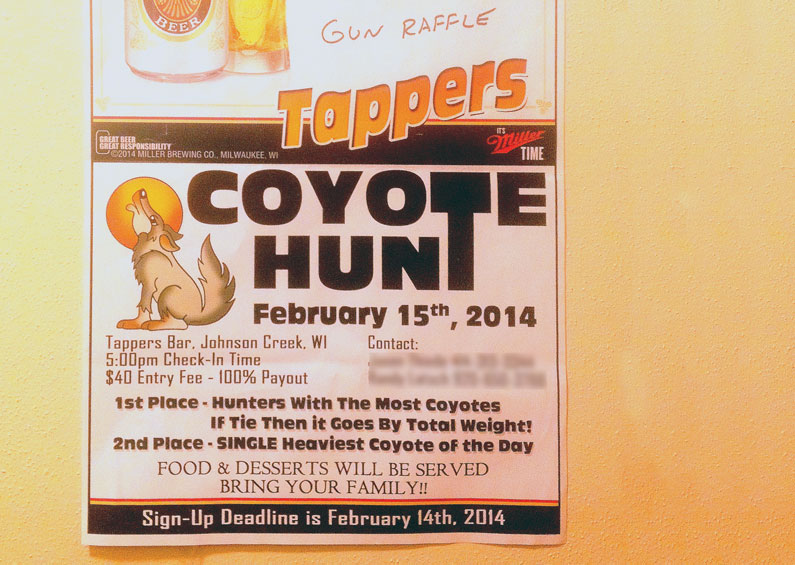The case for banning wildlife-killing contests
Above photo: Sign advertising Coyote Killing Contest in a bar by Jim Larrison (CC BY 4.0)
By Camilla H. Fox
Special to The Bee
On Feb. 14, while many were enjoying romantic dinners and exchanging words of love, the California Department of Fish and Wildlife’s law enforcement division was on red alert for a wounded warden who had been shot by a coyote “contest” hunter in El Dorado County. Warden Bob Pera was on night patrol monitoring a predator-killing contest when he was shot. Contestants were traipsing the woods to pursue and kill as many coyotes, foxes and other predators as possible when bullet fragments entered the warden’s neck, endangering his life.
One week earlier in Modoc County, resident Roger Hopping was allegedly pushed to the ground by a predator-killing contest organizer, Steve Gagnon, when he tried to photograph contest participants. Gagnon was cited for assault while Hopping, who is 73 years old, was rushed to a hospital and, reportedly, suffered a compression fracture in his lower back. The altercation was witnessed by warden Aaron Freitas; Gagnon has not been charged.
Both stories highlight the dangers and violence associated with wildlife-killing contests. Such contests, legal throughout much of the nation, target coyotes, wolves, foxes, bobcats, ground squirrels, mule deer and other wildlife, often taking place in remote locations – sometimes at night – and often with little public or state wildlife agency knowledge. Many species targeted, including coyotes and foxes, have no protections and can be killed year round in unlimited numbers.
Most people are shocked to learn that it is legal to kill wildlife as part of a tournament for prizes and “recreational fun.” They’re even more shocked to learn that thousands of such contests take place each year in the U.S., killing tens of thousands of wild animals. Sportsmen and policymakers are finally speaking up.
Ray Powell, New Mexico’s land commissioner, wrote:
“The non-specific, indiscriminate killing methods used in this commercial and unrestricted coyote killing contest are not about hunting or sound land management. These contests are about personal profit, animal cruelty. … It is time to outlaw this highly destructive activity.”
Widespread media coverage of “Coyote Drive 2013” – the annual coyote-killing contest in Modoc County – catapulted the issue to center stage. A nonprofit organization, Project Coyote, submitted a letter to the California Fish and Game Commission on behalf of 25 organizations representing more than 1 million Californians asking that such contests be stopped. In addition the commission received more than 20,000 letters, emails and petition signatures requesting a ban. Project Coyote petitioned Fish and Game, and commission President Michael Sutton stated,
“I’ve been concerned about these killing contests for some time. They seem inconsistent both with ethical standards of hunting and our current understanding of the important role predators play in ecosystems.”
Today in Ventura, the commission will accept public comment on a proposed draft rule that would ban killing contests for all mammals. At that meeting Project Coyote will submit a letter on behalf of more than 30 scientists making a case for the ban. Key points include:
- Killing an animal without an adequate reason is unjustified and unsportsmanlike.
- Indiscriminate killing is ineffective and it is plausible, perhaps likely, that when associated with a wildlife-killing contest it would lead to increased risk of (livestock) depredations.
- Wildlife-killing contests are not a reliable means of increasing ungulate abundance as some contest supporters contend.
The commission will accept public comment on this issue through Aug. 6, when it will take a final vote on the issue at its public meeting in San Diego.
As the commission reviews and updates its predator policies, regulations and statutes with the aim of modernizing predator conservation and stewardship, we believe the place to start is with those practices that clearly violate scientific, ecological and ethical principles. Starting with a ban on wildlife-killing contests is the right first logical step, which will set the standard for the rest of the nation – as we do so well here in California.
Download the article here.

